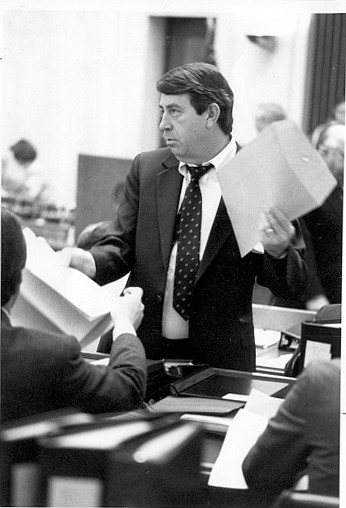Dowd was in the Arkansas Senate for 22 years, taking the oath of office to represent Senate District 12 on the first day of the 1979 legislative session and serving through the end of the year 2000.
After redistricting resulted in a redrawing of district boundaries, Dowd became senator for District 31 when the 1983 session began. After a second round of redistricting, he represented District 4, beginning in 1993.
Dowd was president pro tempore of the Senate in 1997 and 1998, during the 81st General Assembly.
He was Senate floor leader for Gov. Bill Clinton in the late 1980s.
Dowd was a long-time chairman of the Senate Judiciary Committee. Under his leadership, it gained a reputation as a committee where unconstitutional bills died. Dowd was fearless in speaking and voting against bills that were politically popular but that undermined the Bill of Rights, such as measures to prohibit the burning of flags.
Before his election to the Senate, he was a Texarkana city attorney, a deputy prosecuting attorney for Miller County and a chairman of the Texarkana Planning and Zoning Commission.
His legislative accomplishments include a litany of so-called "lawyers' bills," such as Act 407 of 1981, to levy court costs of $5 in criminal actions for operations of the Miller County criminal justice system, Act 447 of 1981 to create Class Y felonies in the Arkansas criminal code, and Act 248 of 1983 to establish new penalties for writing hot checks.
In 1985, he sponsored a package of legislation that reformed the state's juvenile justice system, and, in subsequent sessions, he sponsored and enacted legislation that modernized the Arkansas juvenile code. For example, in 1989 he sponsored Act 294, which established the Juvenile Division of Chancery Court, and Act 418, which provided staffing and salaries for the juvenile division of chancery courts.
In 1987, his legislation created the Committee on Children and Youth, which still is actively involved in monitoring juvenile detention facilities, the children's foster care system and laws on adoption. Also in 1987, he sponsored Act 713, to establish the rights of the terminally ill.
In 1989, Dowd was a co-sponsor of the state's first 2 percent tourism tax, which has become a vital source of revenue for the Parks and Tourism Department. In the 1990s, Dowd added stricter environmental regulations to his legislative agenda, such as Act 454 of 1991 to empower the director of the Pollution Control and Ecology Department to deny permits to industries with a record of noncompliance with environmental laws.
In 1991, Dowd co-sponsored the original legislation that created the Academic Challenge Scholarship program. At the time, it was funded through general revenue and has since expanded greatly because it is now funded with lottery revenue.
In 1995, Dowd sponsored Acts 1005, 1006 and 1007 to fund a highway program that relied on the issuing of bonds, backed by motor fuels taxes.
Dowd was a consistent supporter of the Arkansas Waterways Commission and the Red River Association, which works to improve the river as a navigable transportation link.

